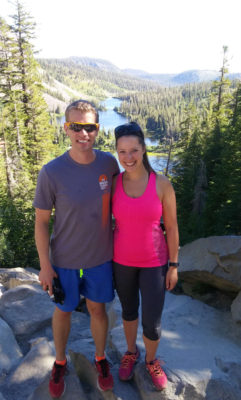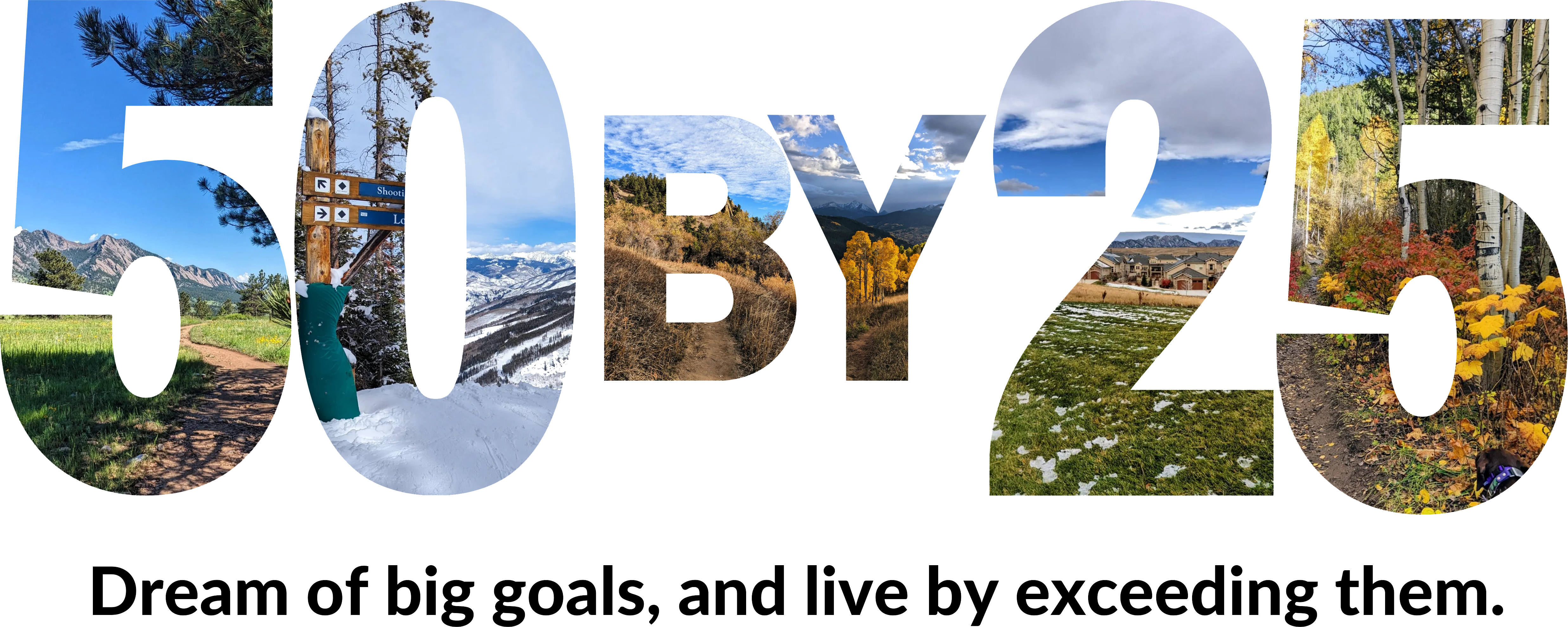I’m having an amazing time in Mammoth Lakes, California. This morning, we went out on a four mile trail run that took us from an old mining town, through various campsites, past a beautiful waterfall, and ended at a lake where we enjoyed a fabulous picnic brunch. Breakfast burritos, fresh fruit salad, and the best coffee cake I’ve ever had in my life! Our run was led by Olympic gold medalist Deena Kastor, and it was so awesome to run next to her and chat with her as we ran, like we’re just regular running buddies.

After lunch, the fifteen of us on the retreat had a seminar with Deena on goal setting. A lot of it was stuff I already knew – the importance of figuring out why you’re setting a goal, documenting the steps you’ll take to reach it, figuring out your backup plans and how to turn the negatives into positives, etc. But Deena also told us a really amazing story that reminded me it’s important to dream big.
At the 2004 Olympics in Athens, Deena famously came from behind to win the bronze medal. She was in 12th place with only a few miles to go, and started passing runner after runner, all fading in the heat. When she made it into 4th place and could see the remaining contenders ahead of her, she made it her goal to just get a medal. (Note that she was the first American female to medal in the marathon since 1984, so this was a big deal.) But when she crossed the finish line all smiles, having done just that, she found the first and second place runners throwing up from their own exertion – and realized she hadn’t given it all that she had. What if she hadn’t limited herself to just getting “a” medal, but went after silver, or gold? Would that intention have encouraged her to give more effort and perhaps succeed in doing better than her wildest dreams? Who knows.
Deena pointed out that when a lot of runners prep for a race, they set their A goals, B goals, and C goals. The A goal is what you want to achieve if things go according to plan, and the B and C goals are backups in case things go wrong. But what if we went into a race also having B and C goals that are in case things go right? What if you are having an amazing day – shouldn’t you strive for more than you previously thought possible?
Thinking back to my own 5K PR this spring, I ran it without my Garmin and with an A goal of breaking 24:17 (my old PR). I then ran the first mile in 7:00 even, which actually felt comfortable. My second mile was a still-speedy 7:24, but my third mile was a 7:28 – just slightly slower, even though it should have been faster when I was sprinting to the finish. I had let myself be content with breaking 24:17, instead of trying to achieve a loftier goal when I saw how well the day was going.
After all the discussion today around running fast, I’m now thinking that perhaps I need to set a really big goal and try to break 21:00, or even 20:00. Oh my god, I can’t even tell you how incredibly unbelievable it would be to me to have a 5K PR that’s in the teens… I literally can’t even fathom that as something I could possibly do. Maybe it is, and maybe it’s not, but this retreat has gotten me thinking about the possibilities.

More to come on this gorgeous retreat and our adventures in Mammoth Lakes…

I love this and it can be so true – especially with running! I think it can be very hard to know what we are actually capable of. I was listening to a podcast interview with running coach Jason Fitzgerald and he was saying how it can take up to 10 years of very consistent work and experimentation to actually reach your full running potential, and even then who knows! Great reminder not to doubt what we are capable of.
Jason Fitzgerald has a number of books on brain training for athletes… but I haven’t yet made the time to read any. I need to get on that!
Want a sub-7 min pace 5K?
Every week work the way up to a 6×1 mile (1600m) workout with 440yd/400m SLOW jog recovery in between at 1:45 per lap (or quarter mile). I told a friend I would give $12 for every second under 21:39 she got — if she worked her way to that workout. She ended up only doing 5×1 mile and was 3 seconds over (21:42)! Heck, I’ll make the same deal for you (to your charity of choice): $12 per second under 20 minutes with the magic number of 1:38 per lap. Open-ended completion date.
Want a sub-18 5k?
Develop that same workout (every week until each lap is about 1:30-1 per lap). That’s what I did when I ran my 17:50 3mi (not a 5K) personal best (6:10, 6:00, 5:40 approx). And I totally believe I have a lot of time left to work off – without deviating from my standard workouts yet.
Anyway, as you know by now, I am a total believer that just about everybody is an underachiever – DREAM BIG (based on my own experiences as an underachiver!)
That sounds like a brutal workout… I may have to try it 🙂
Putting it all on the line is tough, but is usually worth knowing that you did your best after the fact.
Yes! I need to work on that…